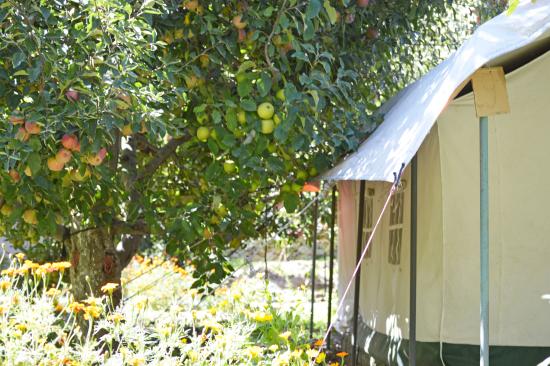Eshel: What's the question?
 |
| https://media-cdn.tripadvisor.com/media/photo-s/09/96/9e/37/apple-orchard-farm-and.jpg |
"...יִּטַּ֥ע אֵ֖שֶׁל בִּבְאֵ֣ר שָׁ֑בַע וַיִּ֨קְרָא־שָׁ֔ם בְּשֵׁ֥ם
He (Avraham) planted an ‘eshel’ in Be’er-sheva, and there he proclaimed the Name of Hashem, G-d of the Universe” ( 21:33).
What's an eshel? As it was planted, one would think it's a type of tree. But it is not completely clear.
Rashi cites the difference of opinion (in Sota 10a) between Rav and Shemuel as to what the eshel actually was. One held that it was an orchard from which to supply fruit for the guests at their meal. The other held that it was an inn for lodging in which were all kinds of fruit. The former takes vayita as planted, while the latter associates it with the same word used for erecting a tent, (as we saw in last week's parsha.,though the Gemara cites a phrase from a verse in Daniel).
Both takes, however, come to show Avraham's great chesed in extending whatever his guests would want. And that's why some read אֵ֖שֶׁל as an acronym for Achila [eating] Shtiya [drinking] (or Shchiva [sleeping]) and Levaya [accompanying out], as the The Torah Temima says.
He explains that the three letters of אֵ֖שֶׁל ESheL can be rearranged to ShAaL, meaning ask to indicate that that whatever fruits a person would ask for would be given, figs, grape, pomegranates, hence the association with an orchard. The other view on what was asked would extend to meat, poultry, fish, and wine, which is more associated with the fare at an inn. (BTW in today's shiur Michal Howrowitz made the point that sometimes the host should ask, "Would you like me to pass you ..." because some guests are too shy to ask.)
Avraham would welcome his guests, bring them all that their hearts desire and then he would tell them that all they enjoyed came from G-d. It was the first kiurv project, and like they tend to do today, the way to get people in was through food.
Still: why the difference of opinion on whether that kind of hospitality should be imaged as pardes or pundak? I recall the explanation that Rabbi Copperman said. The difference is that the pardes assumes a more elitist approach, specifically to engage with the more intelligent people, while the pundak is open to everyone.
Now I want to add a spin to this, which explains this post's title and the question. I'd venture to say that there would be a difference in questions at the pardes and the pundak. While the latter would be about food, whether it was "what would you like to eat?" or the guest asking "Do you have fish?" the former would include those very questions that Avraham asked himself when he was searching for the Creator and came to recognize who the Ba'al Habira was. Indeed, this difference persists today. Around some tables, the talk may be only about how delicious the roast is, but around other tables, the conversation turns to Torah.
On Shabbos I though of yet another turn aspect related to the argument between R' Akiva anbd Turnusrufs related here: http://kallahmagazine.blogspot.com/.../natural-vs-man... The debate would not then be merely about the greatness of man's perfecting the world but the way one can come to recognize the Creator as coming through personal actions. While Avraham did come to recognize the Creator by observing the creation, he then transmitted this knowledge by making bread for guests. He would then trace the food back through its ultimate Supplier and get his guests to recognize that they should be thanking G-d rather than their human host for their sustenance. That is, we could say, a point R' Akiva is making about coming to recognition of the Divine through what people do, which fits very well with his view that "veahavta le'reacha kamocha is "klal gadol baTorah."
On Shabbos I though of yet another turn aspect related to the argument between R' Akiva anbd Turnusrufs related here: http://kallahmagazine.blogspot.com/.../natural-vs-man... The debate would not then be merely about the greatness of man's perfecting the world but the way one can come to recognize the Creator as coming through personal actions. While Avraham did come to recognize the Creator by observing the creation, he then transmitted this knowledge by making bread for guests. He would then trace the food back through its ultimate Supplier and get his guests to recognize that they should be thanking G-d rather than their human host for their sustenance. That is, we could say, a point R' Akiva is making about coming to recognition of the Divine through what people do, which fits very well with his view that "veahavta le'reacha kamocha is "klal gadol baTorah."
Related post:
GREETING GUESTS AND MORE IN VAYERA
Like and follow on Facebook https://www.facebook.com/KallahMagazine/
Comments